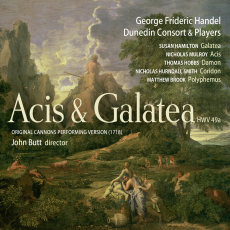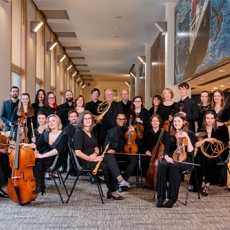Handel's Acis & Galatea - Dunedin Consort - 6moons
If you enjoy opera and SACD, your opportunities for celebration are few and far between. Exclude re-editions and they are downright sporadic. Just for that reason you won't want to miss John Butt's refreshingly novel read of Acis and Galatea but in all fairness, be it CD, SACD or download, this recording is a jewel regardless.
Händel's Acis and Galatea tells the story of Acis, a young shepherd from Sicily and his lover, the nymph Galatea. Unfortunately the cyclops Polyphemus has other matrimonial plans for the young and beautiful Galatea despite her absolute loathing of the ugly creature. After discovering the lovers, Polyphemus kills Acis by throwing a huge rock at him (typical cyclops negotiation strategy) but Galatea overcomes her despair, appeals to the Gods and turns Acis into an undying fountain, an act that restores peace and harmony in the paradise-like setting of the opera.
Typical of the pastoral compositions of the time, plot and action won't keep you on seat's edge but this very simple story gave Händel the perfect material to work on music in depth, using it to paint landscapes and emotions rather than support the stage action. By reverting to the original version of the composition rather than Mozart's or Mendelssohn's later re-orchestrations or even some of the later scores by Händel himself, John Butt considerably simplified the composition of the orchestra (no violas, fewer violins) and reduced the chorus to just the five soloists. The result is an interpretation that gets rid of the spider webs in the corners, that is lean and fast, light and agile. Take any recording of the re-orchestrated versions by contrast and it will sound both heavy and boring.
The Dunedin Consort and the soloists both are first class, fast and deploy all sorts of varied tonal colors and contrasts with a tempo that is engaging without feeling reckless. They give this pastoral little opera all its charm -- actually far more charm than it's had in any recording I know -- by revealing the contrasting elements and fluttering music that was hidden beneath the redundant complexity added over the centuries. Absolutely and unconditionally recommended as the new reference recording of Händel's Acis and Galatea, it easily replaces William Christie's more conventional and less enlightening interpretation. The fact that Linn's recording quality is simply superb does not hurt either.

